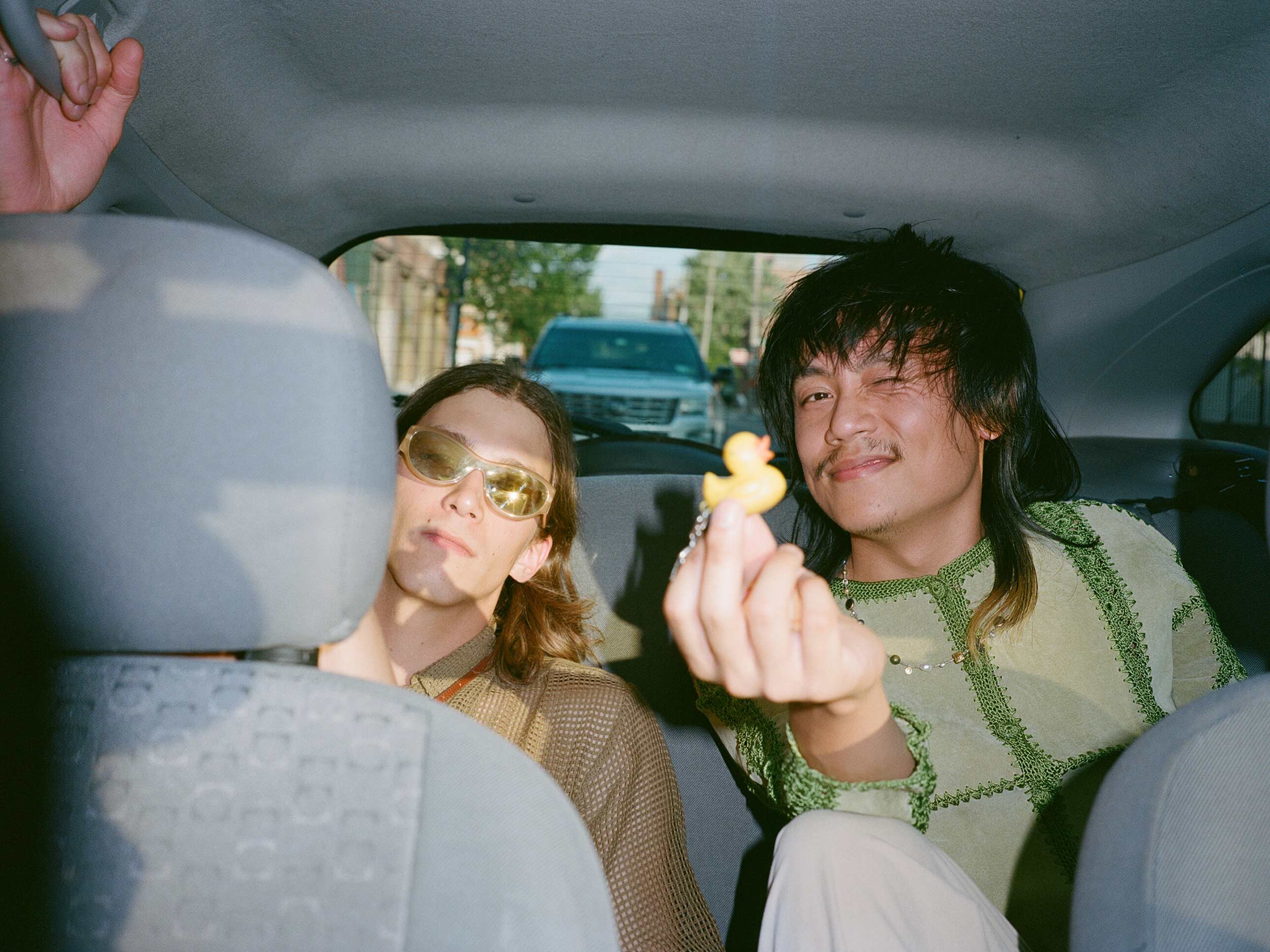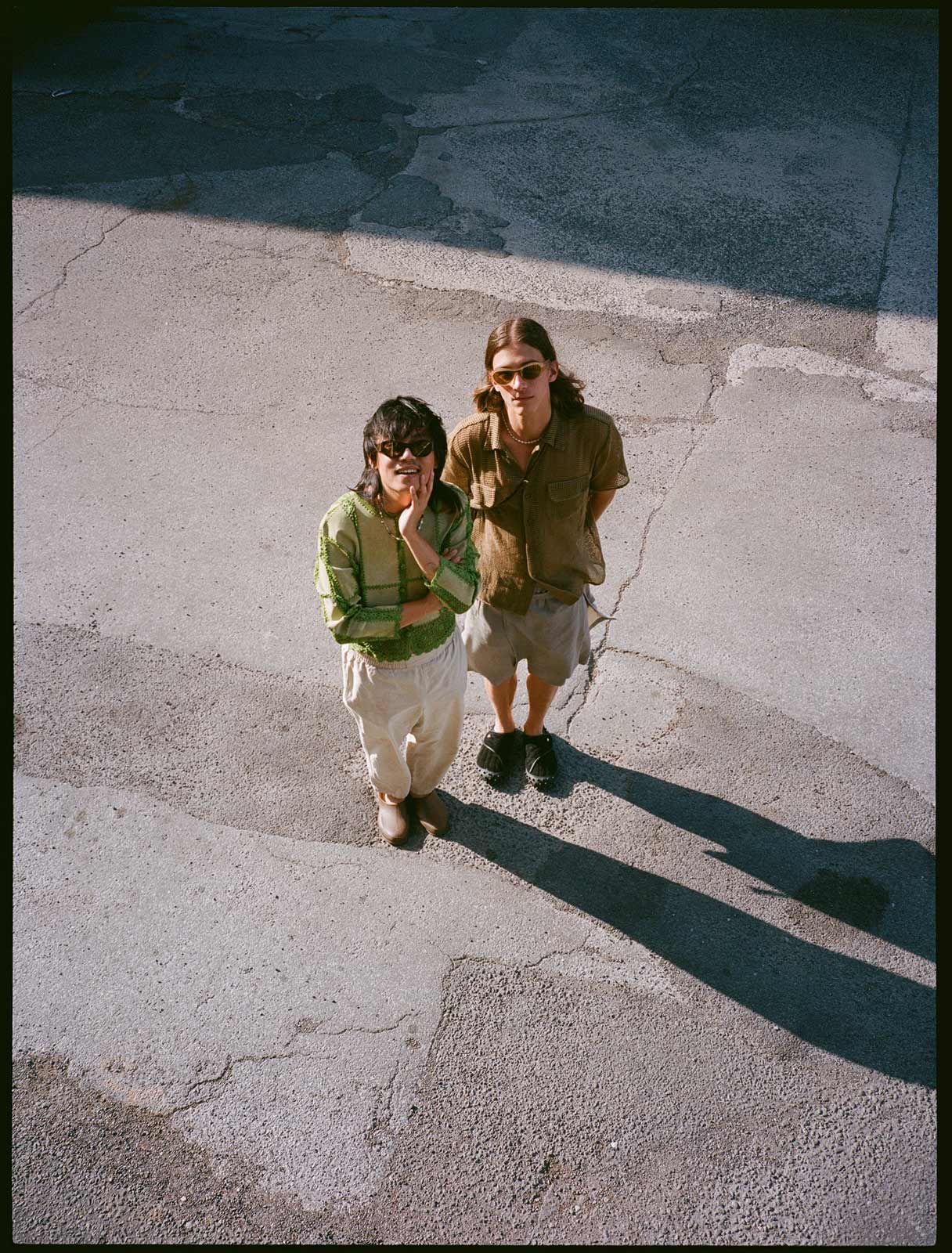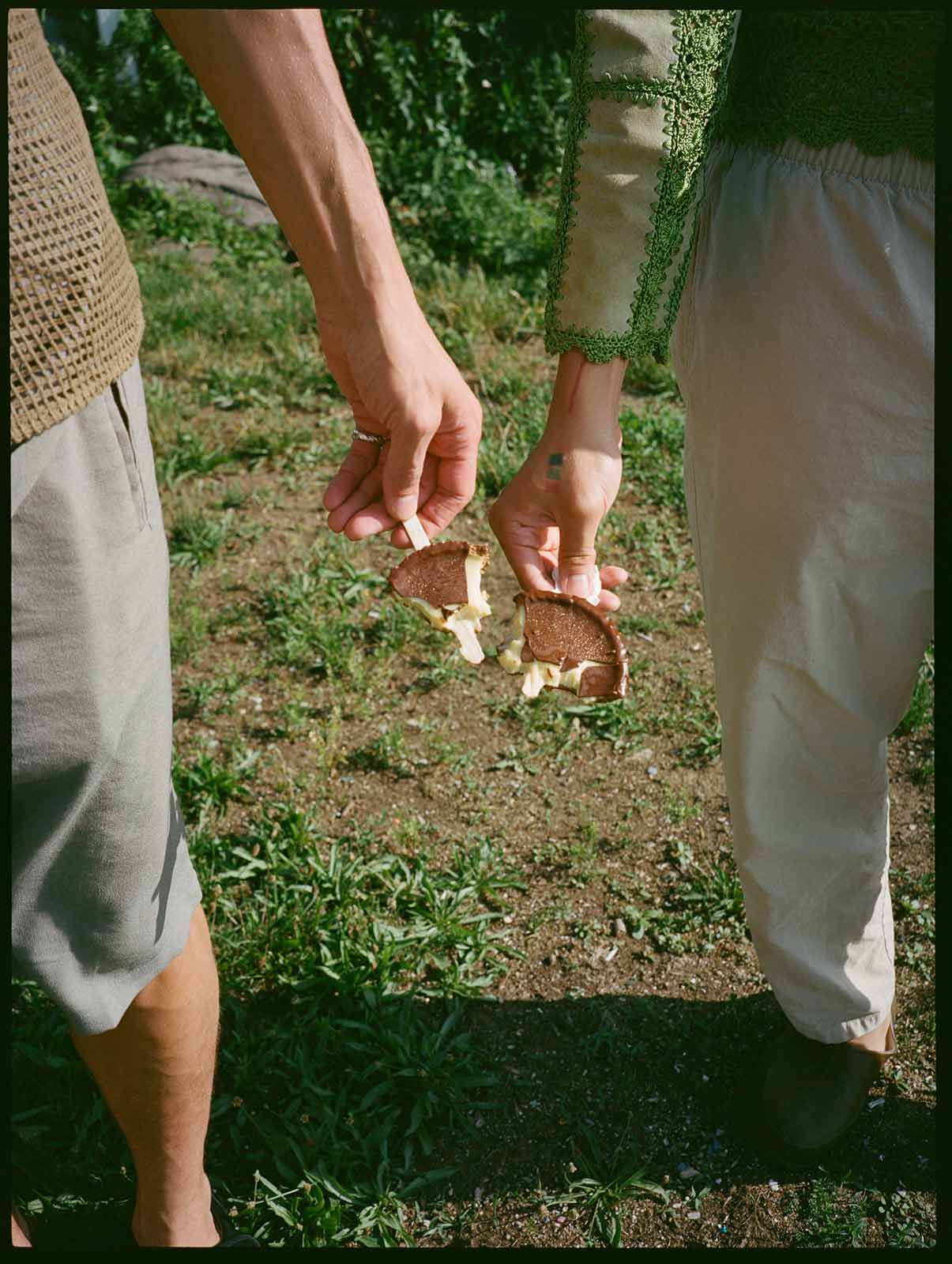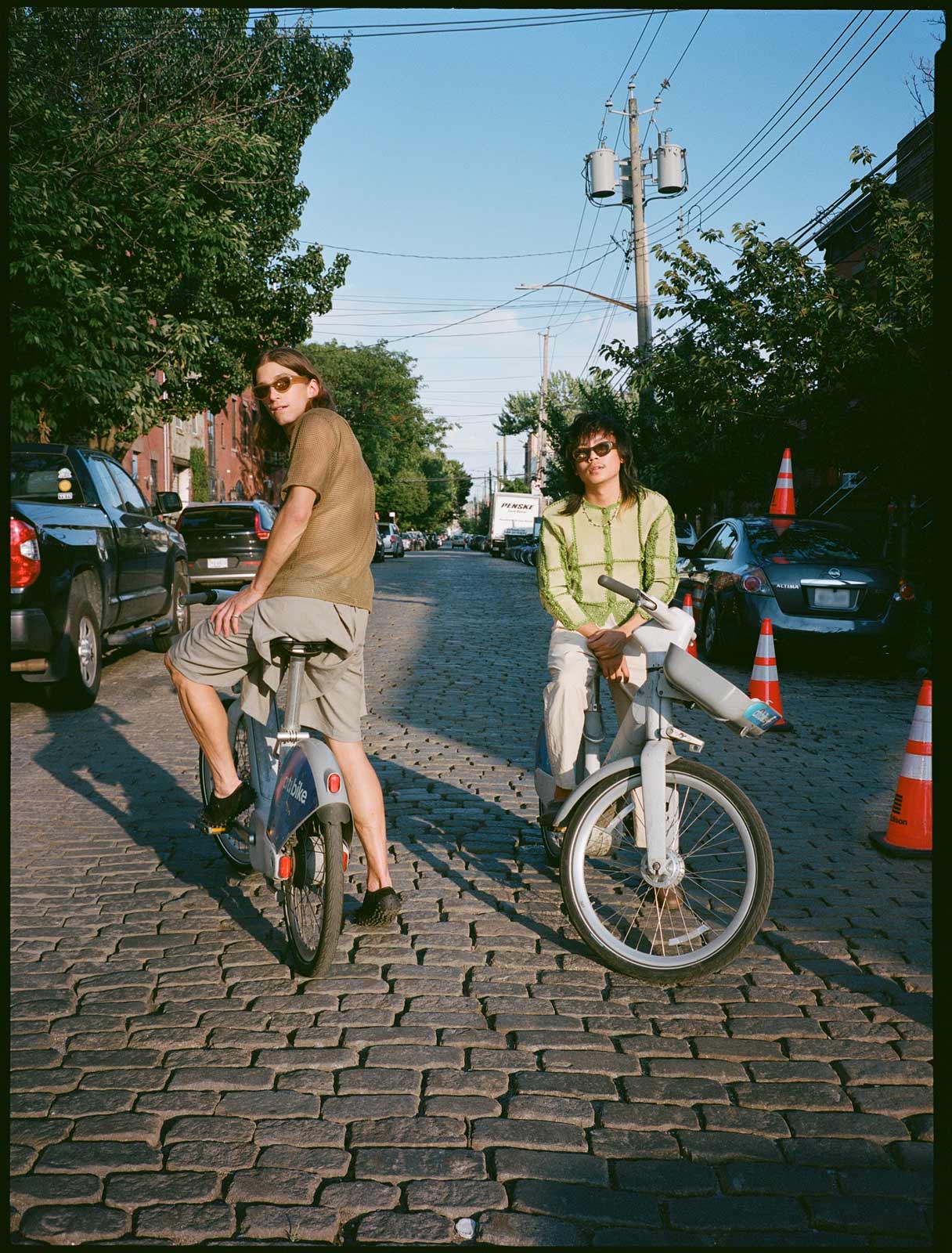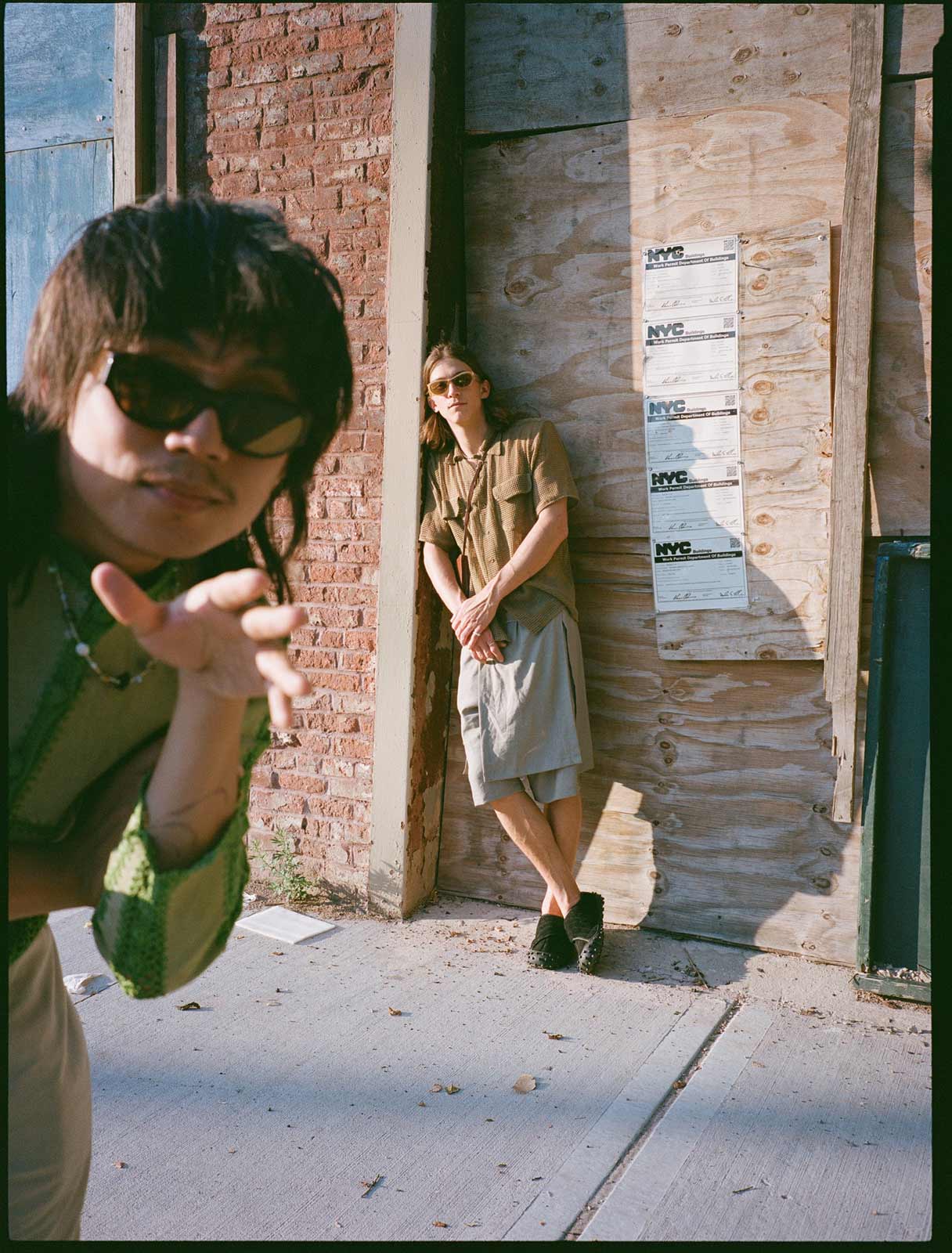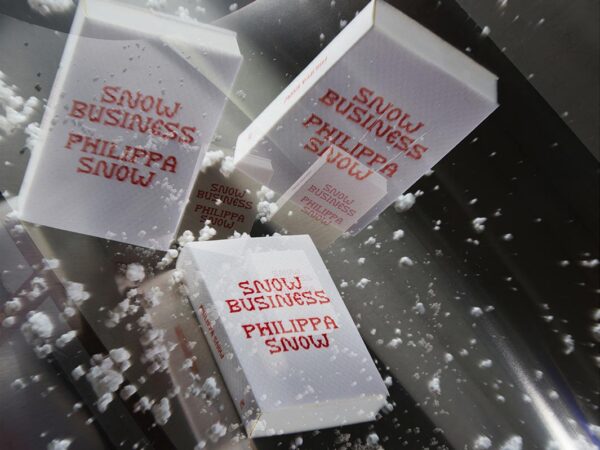Following a spring tour across New York, Tin Mai and Pierce Abernathy join Document to expound upon the intent of their food-focused creative collective
Finding the elusive intersection of sustainability and quality of taste—in procuring a meal that doesn’t require extravagant technique and hundreds of dollars and six hours of prep time—makes earth-friendly eating feel inaccessible. Of course, you’d like to do your part in not further contributing to the demise of our planet and the populations it hosts. But rendering that care is a lot of work; and often, proponents of good food consumption are more interested in establishing their own ethical superiority than they are in encouraging you to join them.
Aerthship—pronounced the same way as the architectural style (earth-ship), or more abstractly (air-th-ship), or really, however you feel like saying it—is an effort to break those barriers to entry. Equally driven by ethics and enjoyment, it’s an “eco-harmonious collective working inside a multiverse of food, music, fashion, and arts—each coexisting to bridge the gap between some of the most powerful forces in our lives: (1) ecology and (2) culture.” Its concept is laden with what are usually bullshit buzzwords, but the collective employs them assiduously—and does so well beyond that internet bio: Its founder, Tin Mai (of 88rising), trends toward the word connect over the course of our hour-or-so-long conversation. Aerthship’s Pierce Abernathy, comparably, likes the word rooted. For him, it doesn’t seem to be a pun about farming and relationships—the tenants of the pair’s beloved food-focused creative collective—but rather, a way of thinking. In that same hour, he employs the word six times, each with as much vehemence as the last.
In the collective’s own words, “Food is an act of love in whatever way you need it to be: an expression of romance, of friendship, of affection for the self, of care for the earth—it’s sustenance and a declaration of devotion of time and effort.” It sounds a bit fucking corny, but they mean it in earnest. For Aerthship, food is really only a piece of its greater story, hoping to extend its ethos into all facets of culture. They’re working to build something that feels welcoming and intentional in a world that’s often exclusionary and commercially-minded.
Following a spring tour across New York, helmed by Abernathy, Aerthship joins Document to expound upon the objectives of their collective.
Megan Hullander: It seems as if you guys are almost introducing a sense of luxury to sustainability. Where do you see the most opportunity to make environmental consciousness feel indulgent with food?
Pierce Abernathy: I don’t think we associate it with luxury. We’ve been really focused on the experience; we want to bring people into a space that they’re going to really remember.
Tin Mai: Luxury is a funny word, because it is associated with inaccessibility and exclusivity. I guess having access and a direct connection to the earth is often seen as pretty luxurious—which is messed up.
Pierce: It’s important to ride the line of a variety of experiences. I want to reach the largest audience possible: making food that feels healthy and earth-focused, but also accessible in terms of time, and in terms of ingredients. There is a lot of privilege around eating healthy, because it costs a lot, it takes a lot of time, and it’s a skill. People don’t think to talk about the latter two things—that just because someone can buy this ingredient doesn’t mean they have the necessary time or knowledge to make it.
Tin: Most people don’t care about eating plants, or being vegan, or whatever until it’s actually delicious. Until it’s luxuriously delicious. That just speaks to Aerthship’s mission: No one is tapping into caring about the earth until you make pathways for them to. I think elevated is a good word.
“There is a lot of privilege around eating healthy, because it costs a lot, it takes a lot of time, and it’s a skill.”
Megan: I think ingredients might be the most obvious way that a locale might inform how you build an experience—but how else do physical spaces inform your process?
Pierce: The tour was [centered] around urban farming in New York. And we really wanted to ensure that it felt like a true collaboration with the people that we were partnering with. So first and foremost, we were like, What are you doing? How can we highlight that? What is the best way for us to work with you?
For me, too, I wanted to explore a variety of cooking styles and formats. We wanted to ensure that we hit different ways of serving food, from à la carte at Rhodora, to free food on the street, to a more intimate event at Public Records.
Tin: When we did a project in a foreign space, where we didn’t live—like, for example, Vancouver Island with Gucci—that was about really focusing on the original stewards of the land. First Nations, Indigenous people. A lot of that project was focused on connecting with fishermen to source everything, and really integrating [them into the project].
Pierce: We worked with local foragers, an incredible farm florist—people who have a relationship with that land. Because we didn’t know that space, and we didn’t want to fake it, but we also didn’t want to just go to the grocery store and buy things. We were able to build this little community, and now we have these amazing friends who are doing incredible work.
Megan: My understanding is that you’re both self-educated in the food space. What does that mean for your research process and ideating new projects? Is it all really hands-on like that?
Pierce: I think we’ve been able to slowly build the Aerthership team and find key players who are skilled in areas that we aren’t; [it’s all about] learning from them and supporting each other.
This tour was chaotic, and it was exhausting, but I feel like now we can look back and our confidence is so much higher. We know we can just jump on these things and make it work. Sometimes the best way to learn is [by] throwing yourself into the fire and figuring it out.
Tin: Aerthship was born out of listening to farmers. East Branch Farms is one of our biggest influences, even spiritually, too—they know what’s up, they’re touching it every day. The wisdom I’ve found from farmers is so boundless. The research has always started there, especially for food.
“I think we’ve definitely become much more abstract in how we think about sustainability. It goes beyond supporting a small farmer, shopping locally, composting—it’s rooted in this idea of consciousness.”
Megan: Is it hard to maintain the sense that things feel salvageable when things something cut off?
Tin: That’s something we’re all gonna struggle with for many generations. We’re trying to coin this term—we say it a lot between the core team—eco-cultural hope. It’s hope born out of your daily life once it’s fully integrated with the earth, and you don’t have to suffer in order to get there. Whether Aerthship achieves projects in food and fashion and music, where you’re listening to an album that went through a sustainable release, whatever that means; whether you’re at Pierce’s future restaurant, and it’s completely zero waste and sourcing the best broccoli; I think people need more options to be able to care. A particular example of that [is] with Pierce’s audience: They’re on this journey with him to understand what they can do as a person in the kitchen. Just as a starting point, like, Where did your broccoli come from? Or, a lot of people don’t even know what sorghum is. They’re good questions to ask.
Megan: Sustainability implies a sense of additional work or restriction—but where do you think it offers more room for you to play?
Pierce: I think we’ve definitely become much more abstract in how we think about sustainability. It goes beyond supporting a small farmer, shopping locally, composting—it’s rooted in this idea of consciousness. Like, how am I eating dinner? It’s just being very conscious about the world you’re creating around food that ultimately carries out into a consciousness around your life.
Tin: One of the things we joke about a lot is that Aerthship is not going to make merch—that is the least sustainable thing to do. It is an interesting challenge to make people care without merch. You can’t wear the t-shirt, but there are some real ways that you can be part of this community. There are really cool, stylish ways to be involved with the earth—that’s what we truly believe in.
Megan: I mean, so much of your work seems centered around the experiential. Have you felt like it’s hard to get people to leave without wanting something more tangible?
Tin: There’s a life and death cycle. As you creatively work on anything that is true to the earth, it means that it lives, and then it dies—there’s a cycle to it, there’s this slowness to it. We talk a lot about how we stop chasing the algorithm, because that seems to be detrimental and antithetical to ecology and sustainability.
Megan: What sort of answers have you found in breaking from the algorithm so far? How do you detach from something that does, a lot of the time, feel necessary to building community?
Tin: A chat like this is the most we’re preaching about any of this. On the tour, you’re just eating the food, and then you can pick up the zine and read about this stuff, and then hear Pierce talk about the food and where it comes from. The earth will speak for itself, especially when we do projects that are really remote. [We’ll go] upstate, for example—30 people will bus up and have a whole evening. When they arrive, it’s not like there’s this manifesto that plays and it’s Clockwork Orange eyes. We put a wine glass in your hand, something organic, and tell you to walk 20 feet toward the pond. And you will understand that.
“We put a wine glass in your hand, something organic, and tell you to walk 20 feet toward the pond. And you will understand that.”
Pierce: It is a tricky line of trying to part ways with the algorithm, and making sure that we’re staying in the cultural conversation. Maybe we have to hijack the algorithm to really cater to how we want to do it. But, hopefully, the experiences really speak for themselves.
Megan: How do you think about setting the tone for the experience outside of the menu?
Tin: Good music, man. If we’re enjoying it and we like it, that’s a good start.
Pierce: I think it’s really rooted, too, in being comfortable. No matter [what we’re] doing—a high-end brand dinner or giving away free food—I crave that comfort.
Tin: Years ago, when Pierce and I weren’t even working with each other, and I was still a performing musician in Brooklyn, I was having my first show; I think it was on my birthday. I was a nervous wreck, and right before I [went] on, I realized I hadn’t eaten dinner. Pierce hands me this Tupperware of chicken curry—everything felt right after that. I sang my heart out. I think that [sense of] safety is a really crucial piece of what we want people to find in these events—that sense of home and connection. You’re making a memory from that moment.


